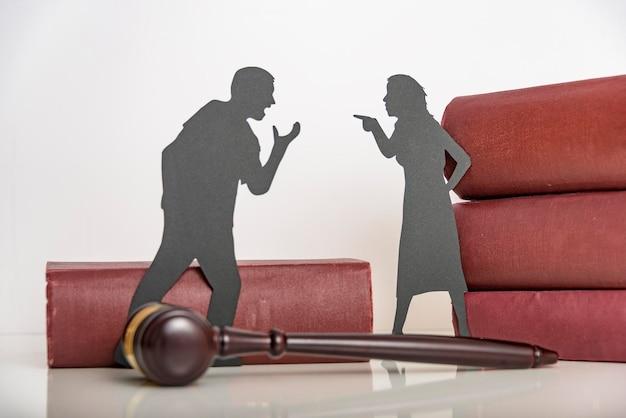Divorce can be a messy and emotionally draining process, not only for the couple involved but also for their family and friends. Mediation is an alternative to a traditional divorce that can help couples separate amicably and save them from lengthy legal disputes. In this blog post, we’ll explore whether mediation is right for you, the mediation process for separation, and tips and tricks to make divorce mediation more effective. So, if you’re considering divorce or separation and want to explore your options, keep reading.
Mediation for couples: A Win-Win Approach
Have you ever had to break up with someone you loved and found that communication was not easy? Of course, you have! It can be overwhelming, toxic and end up in a bitter situation. However, the beauty of the modern world is that there is always a solution to every problem.
Mediation: The best way to go
Mediation is an affordable, time-bound process that helps couples separating to resolve their issues without going to a courtroom. With the help of a skilled mediator, both parties can create customized solutions that benefit them and their children. The goal of mediation is to reach a fair and equitable agreement that meets the needs of both parties.
The Benefits
Mediation offers numerous benefits for those going through a separation. Some of the benefits include:
– It is cost-effective compared to going to court.
– It is confidential, and both parties can speak their minds without fear of judgment.
– The agreements reached in mediation are tailored to meet the specific needs of the parties involved, which is not often the case in court.
– Mediation provides a faster resolution than going to court. The decisions made in mediation are binding, unlike in court cases where one party can appeal the decision and prolong the process.
The Process
During mediation, the mediator acts as a neutral third-party, facilitating communication between the parties involved. The mediator helps the parties to identify their issues and facilitates the negotiation of a mutually beneficial agreement.
The first step is usually the consultation stage, where both parties meet with the mediator separately to explain their concerns. The mediator then schedules a joint meeting to begin the negotiation process.
During the negotiation stage, both parties get a chance to speak their minds, after which the mediator facilitates a discussion to help the parties reach an agreement.
Once an agreement is reached, the parties review and sign it, and it is then presented to a court for approval.
Mediation is a friendly and effective way to resolve issues for couples going through a separation. It is a cost-effective and time-efficient process that enables both parties to create a customized resolution tailored to their needs. Mediation also encourages open communication and provides a non-judgmental environment for both parties to speak their minds. It is the perfect Win-Win approach for couples separating!
Can You Mediate a Divorce? Here’s the Scoop!
One of the most common misconceptions about divorce mediation is that it’s only suitable for couples who are amicable and have little to argue about. However, the truth is that mediation can work for any couple, regardless of how much they disagree or how complicated their situation is.
What Exactly Is Divorce Mediation
Divorce mediation is a process where a neutral third party, known as a mediator, helps couples sort out their differences and come to a fair and amicable agreement about important issues such as child custody, property division, and spousal support. Mediation is generally less costly and time-consuming than traditional litigation, making it an attractive alternative for couples who want to avoid the emotional and financial toll of a court battle.
What If We Can’t Agree on Anything
If you and your spouse have a hard time agreeing on anything, don’t worry! That’s precisely what the mediator is there for. A skilled mediator can help you communicate effectively and find common ground, even if it seems impossible at first glance. Mediation can be especially helpful if you have children, as it encourages both parents to work together to find solutions that are in everyone’s best interests.
Will a Mediator Make Decisions for Us
No, a mediator will never make decisions for you. Their role is to facilitate communication and help you and your spouse come to your own agreements. This ensures that both parties have an equal say in the outcome and are more likely to be satisfied with the results.
Can We Still Get Lawyers If We Mediate
Absolutely! In fact, it’s often recommended that each party has their own lawyer to review any agreements made during mediation. This ensures that both parties fully understand their rights and the implications of any decisions made.
Divorce can be a challenging and emotional process, but mediation can make it much easier. If you’re considering divorce, don’t rule out mediation! With the help of a skilled mediator and the right attitude, you and your spouse can come to a peaceful and fair agreement.
Divorce Mediation Tips and Tricks
Divorce mediation can be a tedious process, but it doesn’t have to be. Here are some tips and tricks to make the experience less stressful.
Choose the Right Mediator
Choosing the right mediator is crucial. You want someone who is neutral, experienced, and has a good track record of helping couples reach an agreement. Make sure you do your research and ask for recommendations from friends or family members who have been through divorce mediation.
Be Prepared
Before you start the mediation process, make sure you prepare yourself emotionally and financially. It’s important to have a clear understanding of your finances, including assets, debts, and income. Have a list of goals and priorities for the mediation, and understand what you are willing to compromise on.
Communicate Effectively
Communication is key in any mediation, especially divorce mediation. Be open and honest with the mediator and your ex-spouse. Listen to their concerns and needs, and be willing to compromise. It’s important to maintain a civil and respectful dialogue throughout the mediation process.
Take Breaks When Needed
Divorce mediation can be emotionally draining. It’s important to take breaks when needed to recharge and refocus. Take a walk outside or do something that brings you joy. Mediation sessions can also be scheduled for shorter periods to avoid burnout.
Be Patient
Divorce mediation can take time. Don’t rush the process, and be patient with yourself and your ex-spouse. Remember, the goal is to reach a fair and equitable agreement that works for both parties.
In conclusion, divorce mediation can be a challenging process, but following these tips and tricks can help make it smoother and less stressful. Remember to choose the right mediator, be prepared, communicate effectively, take breaks when needed, and be patient. Good luck!
Do I Really Need a Mediator for Separation
So, you’re thinking of breaking up with your significant other? That’s unfortunate and kind of depressing. But you’ve got this! You’ve already realized that you’re better off apart–high five! However, you might be wondering, “Do I really need to bring someone else into this mess?” Well, my friend, the answer might surprise you: yes, yes you do.
Let’s face it: you’re both irrational right now
When you’re breaking up with someone, emotions are high, and it’s hard to keep a level head. Everything that person says grates on your nerves, and you’re ready to fight about anything and everything. And let’s be honest, you’re not the most objective person in the world right now. That’s where a mediator comes in. They’re a neutral third party who can help keep the discussion on track. They can help you both see things from each other’s perspective and work through any issues you might be having.
You might think you’re saving money by not hiring one, but…
Look, I get it. You’re going through a breakup, and it’s expensive. You’ve got to figure out who gets what, and that can be a headache. So you might be thinking, “why waste money on a mediator when we can figure this out on our own?” Well, my friend, have you ever heard the phrase “penny wise and pound foolish?” Not having a mediator can cost you more in the long run. Without someone to help you work through everything, you might end up fighting over little things that turn into big things. And that can cost you both time and money.
You’ll have someone to keep you on track
Breaking up is hard to do, and it’s easy to get sidetracked. You might start arguing about something small, and next thing you know, you’re talking about something completely different. That’s where a mediator comes in. They can keep the discussion focused on the issues at hand. They can also help you both stay calm and prevent things from escalating into a full-blown fight.
They can help you come to an agreement
The ultimate goal of a mediator is to help you both come to an agreement. They’re not there to take sides; they’re there to help facilitate discussion. They can help you both see the other person’s side of the story and find a compromise that works for everyone. And once you’ve come to an agreement, they can help you both put it in writing so that everyone is clear on what was decided.
In conclusion, yes, you need a mediator for separation. They can help you both keep a level head, save you money in the long run, keep the discussion on track, and help you come to an agreement. Trust me, it’ll be worth it in the end.
How Much Does Divorce Mediation Cost
Divorce mediation cost varies depending on several factors, including the mediator’s experience, the complexity of the case, and the location of the mediation. However, it’s safe to say that opting for a mediator over a lawyer will usually cost you less.
Hourly Rates
Many mediators charge by the hour. The hourly rate can range from $100 to $500 per hour, depending on the mediator’s experience and where they’re located. However, on average, an experienced mediator might charge around $150 to $250 per hour.
Flat Fee
Some mediators might offer a flat fee for their services. Depending on the complexity of the case, the flat rate can range from $2,000 to $5,000. However, it’s important to note that if the divorce process takes longer than expected, you might end up paying more.
Splitting the Cost
It’s also common for the couple to split the cost of the mediator. This is often seen as a fair way to divide the cost, and it can sometimes encourage both parties to work towards a resolution more quickly.
Saving Money
Divorce mediation can save you money in the end because, compared to hiring two separate lawyers, the cost of mediation is significantly lower. Plus, mediation is generally a more efficient process, taking less time than going through a court case.
In conclusion, while divorce mediation cost may seem intimidating at first, it’s important to remember that it is often much cheaper than hiring individual lawyers. Plus, utilizing the services of a mediator can streamline the divorce process and possibly save you money in the long run.
When Divorce Mediation May Not Be Your Best Option
Divorce mediation has plenty of benefits, from saving time and money to fostering better communication between estranged couples. But there are times when mediation is not the best option for everyone involved. If you’re considering mediation, read on for some scenarios when it may not be recommended.
High Conflict Situations
If your divorce involves a high level of conflict, you may want to skip mediation and go straight to litigation. Mediation works best when couples are willing to work together to resolve their issues, and if one or both parties are argumentative or combative, the mediation process may only lead to further discord and disagreement.
Domestic Violence
If there is any history of domestic violence, mediation is not recommended. Mediation is intended to be a cooperative process, and it is not appropriate or safe to expect someone who has been the victim of violence to sit across the table from their abuser and negotiate. In such cases, it’s essential to involve law enforcement and a lawyer instead.
Power Imbalance
If there is a significant power imbalance between spouses, such as if one spouse is much wealthier or has more social and emotional support, the weaker party may feel pressured into accepting unfair terms during mediation. Mediation only works when both parties have equal bargaining power and are comfortable with the process.
Hidden Assets
If you suspect that your spouse is hiding assets, such as bank accounts or real estate properties, mediation may not be the best option. During mediation, both parties are expected to disclose all of their assets honestly, but if one party is hiding assets, the process may not lead to a fair settlement.
Substance Abuse
If one or both spouses have a substance abuse problem, mediation may not be helpful. Substance abuse can interfere with a person’s judgment and decision-making abilities, and it may be challenging to come to a fair agreement.
In conclusion, while divorce mediation can be an excellent choice for many couples, it’s not the right choice for everyone. Before deciding on mediation, consider your situation carefully and talk to a divorce attorney to determine which course of action is best for you.
Do couples ever reconcile during mediation
As a mediator, I’ve seen a lot of couples come in with the hope of coming to an agreement and peacefully separating. But every now and then, there’s that one couple that wants to give it one more shot.
A second chance
Before we start the session, I always ask, “Are you both sure you want to go through with this mediation even though you’re not entirely committed to separating?” To which they reply, “Yes, we’re willing to try again.”
The elephant in the room
At this point, I can’t help but feel like I’m the third wheel on a first date. There’s tension in the air, and I can sense them stealing glances at each other. It’s like they both want to say something, but they’re not sure if the other is on the same page.
A tricky situation
At this point, it’s my job to remind them of why they’re here in the first place and that reconciliation isn’t always the best option. After all, they’ve already decided to separate, and going back on that decision could lead to more pain and heartache in the long run.
The verdict
While reconciliation during mediation is rare, it’s not unheard of. At the end of the day, the decision lies entirely with the couple. However, it’s important to remember that every relationship is different, and there’s no one-size-fits-all solution.
So, do couples ever reconcile during mediation? It’s possible, but it’s important to remember why you’re there in the first place. If you’re unsure if you want to go through with a separation, it may be best to take some time to reflect and consider all your options before committing to anything. Remember, a mediator can help guide you towards a peaceful separation, but ultimately the decision is up to you.
What is the Mediation Process for Separation
If you’re going through a separation, mediation is a great way to avoid the drama of a court case and split amicably. But what exactly is mediation and how does the process work? Let’s take a closer look.
Defining Mediation
Mediation is essentially a method of resolving disputes outside of a courtroom. It involves hiring a neutral third-party mediator to help you and your partner come to an agreement on issues like child custody, property division, and spousal support.
The Mediation Process
The mediation process usually begins with an “initial meeting” with the mediator, during which both parties will discuss their goals, concerns, and other relevant information. Once the initial meeting concludes, the mediator will begin working with both parties to reach a mutually satisfactory agreement. This may take several sessions, depending on the complexity of the issues at stake.
Benefits of Mediation
There are many reasons to opt for mediation during a separation. For one, it’s much cheaper and faster than going through a court battle. Mediation is also generally less stressful and emotionally taxing than traditional litigation. And perhaps most importantly, mediation allows both parties to maintain control over the outcome of their separation, rather than having a court impose a decision on them.
All in all, if you’re separating from your partner, mediation is certainly worth considering. With its ability to help you resolve issues quickly, cheaply, and amicably, mediation may be the answer you’re looking for.



